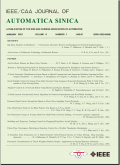首页|期刊导航|自动化学报(英文版)|Point Cloud Classification Using Content-Based Transformer via Clustering in Feature Space
自动化学报(英文版)2024,Vol.11Issue(1):231-239,9.DOI:10.1109/JAS.2023.123432
Point Cloud Classification Using Content-Based Transformer via Clustering in Feature Space
Point Cloud Classification Using Content-Based Transformer via Clustering in Feature Space
摘要
关键词
Content-based Transformer/deep learning/feature aggregator/local attention/point cloud classificationKey words
Content-based Transformer/deep learning/feature aggregator/local attention/point cloud classification引用本文复制引用
Yahui Liu,Bin Tian,Yisheng Lv,Lingxi Li,Fei-Yue Wang..Point Cloud Classification Using Content-Based Transformer via Clustering in Feature Space[J].自动化学报(英文版),2024,11(1):231-239,9.基金项目
This work was supported in part by the National Natural Science Foundation of China(61876011),the National Key Research and Development Program of China(2022YFB4703700),the Key Research and Development Program 2020 of Guangzhou(202007050002),and the Key-Area Research and Development Program of Guangdong Province(2020 B090921003). (61876011)

